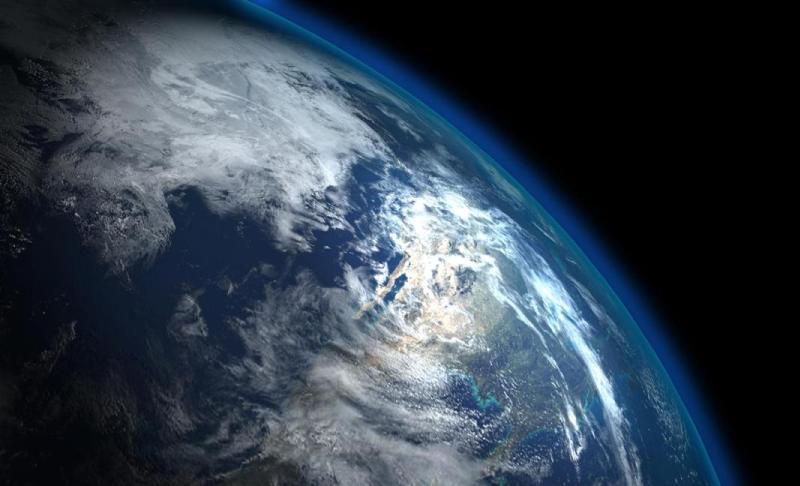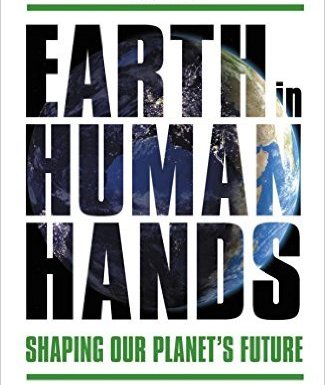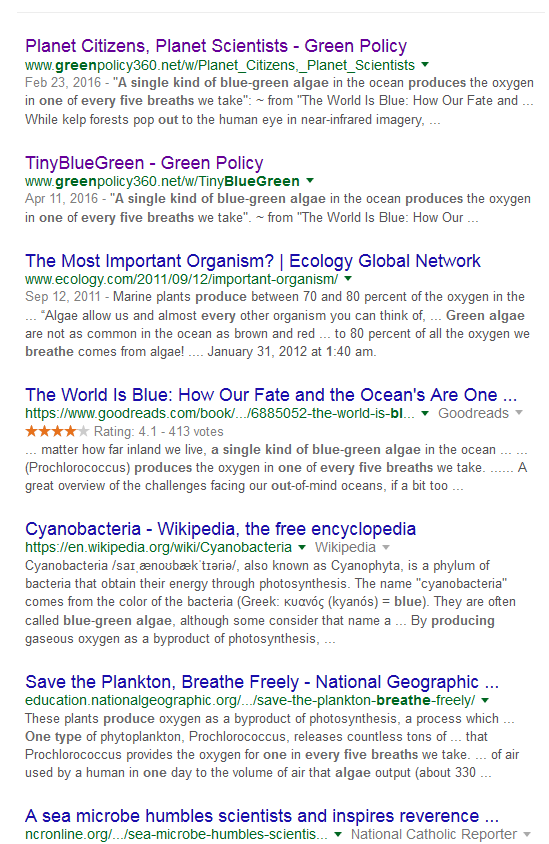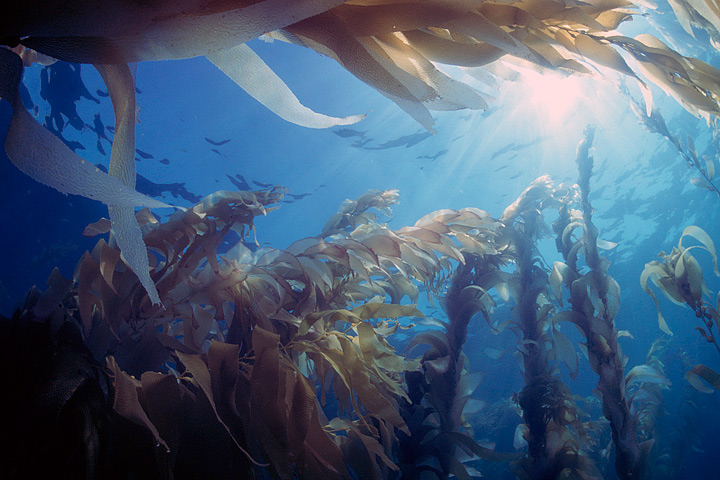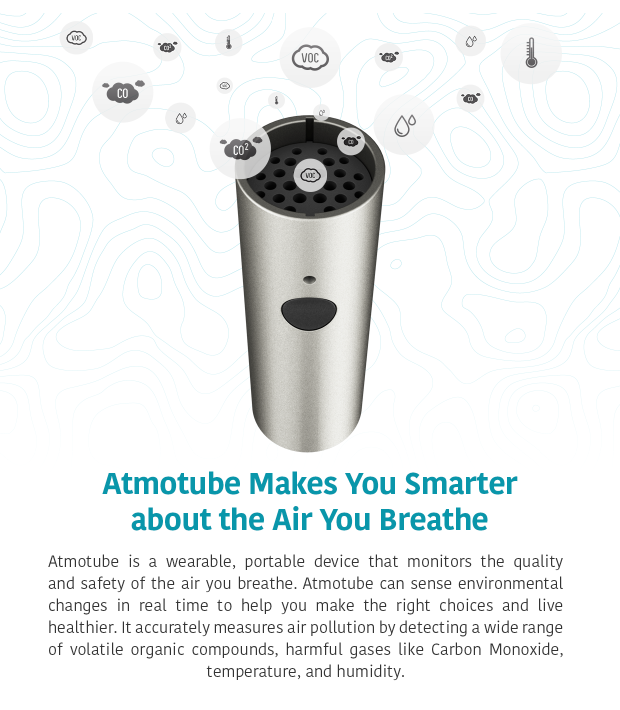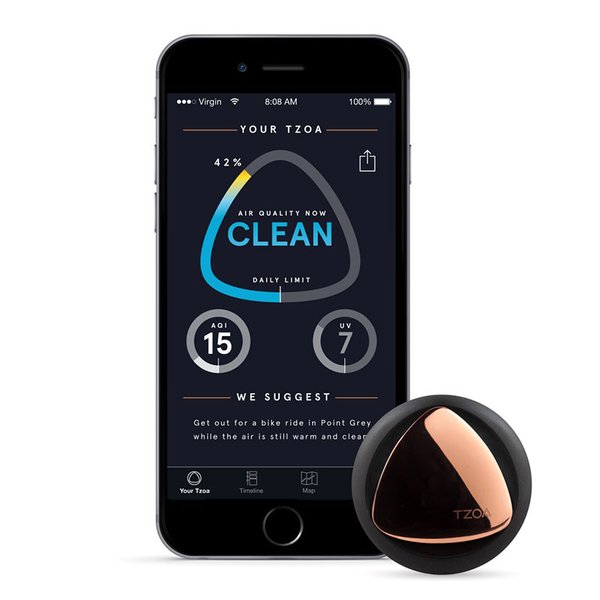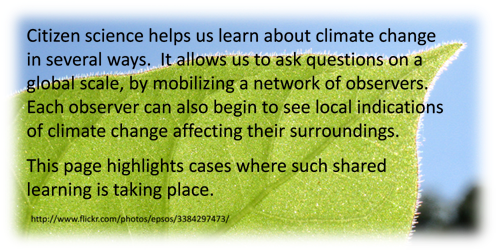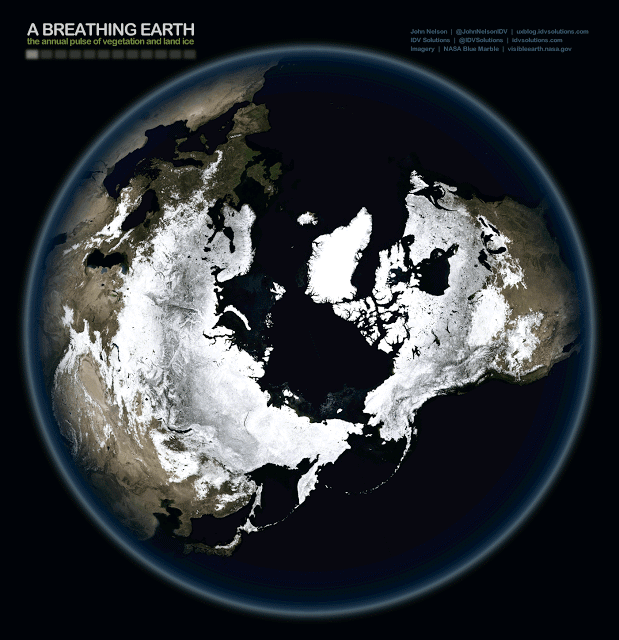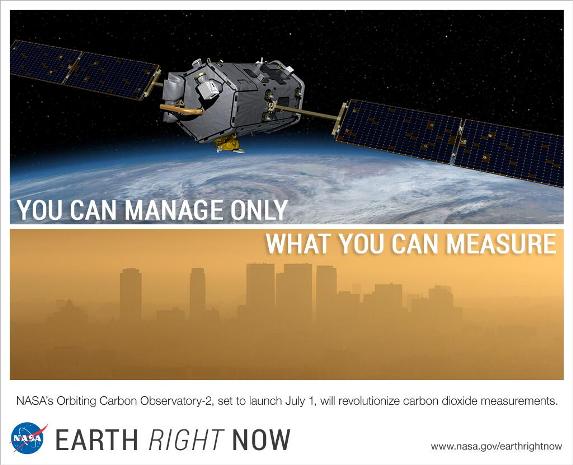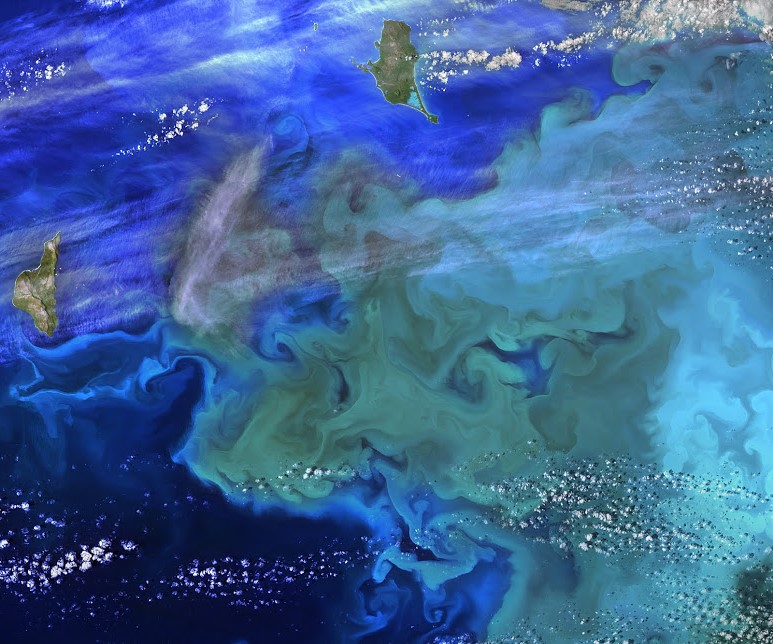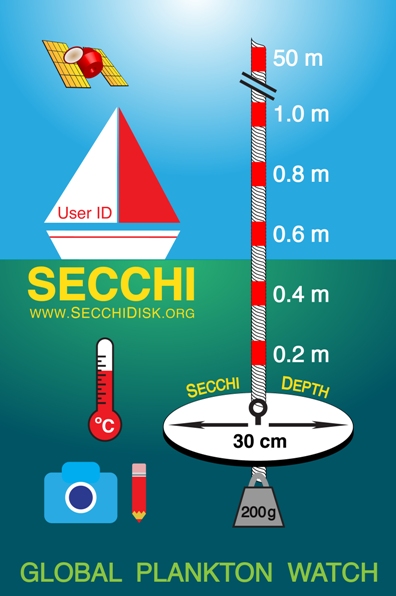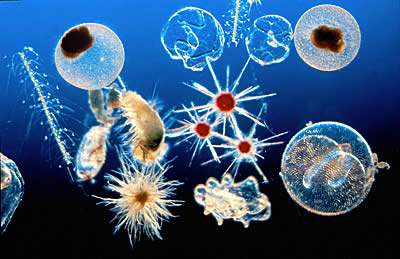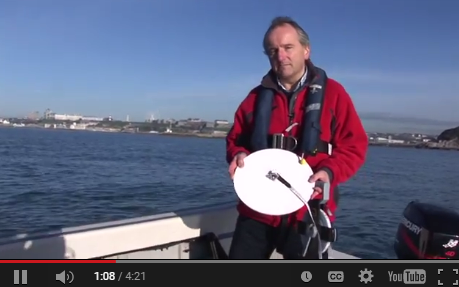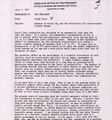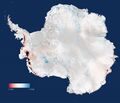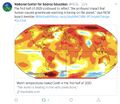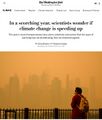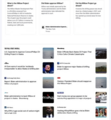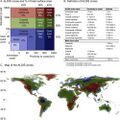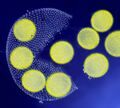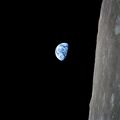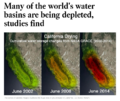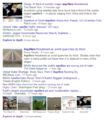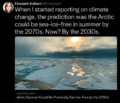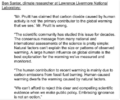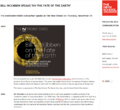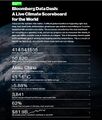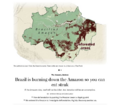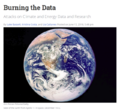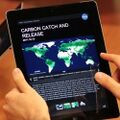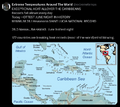Category:Planet Citizens, Planet Scientists
Make a Difference with Planet Science, Citizen Action
Visit Planet Citizen News @GreenPolicy360
http://www.planetcitizen.org / http://www.planetcitizens.org
····················································································
Science estimates over half of the world’s oxygen supply is produced by tiny microbes that live in the sea. And researchers sequencing their genomes have turned up some surprising results... "Photosynthetic organisms in the ocean are as important as photosynthetic organisms on earth... The organisms in the ocean are much less impressive than trees in terms of size, but are extremely important to the biosphere."
Tiny marine plants produce a significant fraction of the oxygen we breathe...
- ○ ○ ○ ○ ○ ○ ○ ○ ○ ○ ○ ○ ○ ○ ○ ○ ○ ○
- Planet Citizens | #EarthMonitoring
- #Earth360 | GreenPolicy360
- #EarthObservations | #EarthScience
- ○ ○ ○ ○ ○ ○ ○ ○ ○ ○ ○ ○ ○ ○ ○ ○ ○ ○ ○
Visit GreenPolicy360's Citizen Science pages
Make a Planet Citizen, Planet Scientist difference
- Citizen Science
New Definitions of National Security
○ ○ ○ ○ ○ ○ ○ ○ ○ ○ ○ ○ ○ ○
Healthy Lungs Are Good
Atmotube: Portable Air Pollution Monitor
Wearable prototype app to track carbon footprints
○
Aclima air pollution sensors mounted on cars
Google Green Blog -- Make the Invisible Visible by Mapping Air Quality
Aclima-Google-City air quality mapping
"The partnership enables a paradigm-shift in environmental awareness by equipping Street View cars with Aclima’s mobile sensing platform to see the air around us in ways never before possible. Three Street View cars took measurements of nitrogen dioxide, nitric oxide, ozone, carbon monoxide, carbon dioxide, methane, black carbon, particulate matter, and Volatile Organic Compounds (VOCs) -- air pollutants which can affect human health or climate change." (from the press release announcement)
Our GreenPolicy360 proposals from 2014/15 have come to be !
Here we are in December 2018 !!
Do You Know What You’re Breathing?
Act to measure the air pollution around you. Make a difference in the air you and your family breathe.
As climate change reports become increasingly dire, and as wildfires tear across the American West, and as trust in the federal government’s air quality oversight fades, thousands of people around the country are taking air measurements into their own hands.
Installed on a porch, a console table or hooked to a backpack, these small, sleek and increasingly inexpensive devices measure hyper-local air quality. They are marketed to the discerning and alarmed consumer. Some have begun to self-identify as “breathers.”
The Atmotube and PlumeLab’s Flow are small and meant to be carried around, testing the air as a person walks or bikes, helping people plan routes that avoid bad air. The Awair looks like an old-timey radio and sits on a counter to test indoor air. Aeroqual’s particulate monitor, one of the most advanced, looks like an enormous old-fashioned cellphone.
But the monitor most intriguing local government environmental protection agencies and civilians alike is PurpleAir. It hooks up outside, connects to Wi-Fi, feeds into a global network and creates something like a guerrilla air quality monitoring network....
○
Citizen Science in Action
Citizen Crowdsourcing, Citizen Networkworking
http://blog.epa.gov/science/2015/03/training-citizen-scientists-to-monitor-air-quality/
https://twitter.com/epablog -- http://blog.epa.gov/science/
-=-=-=-=-=-=-=-=-=-=-=-=-=-=-=-=-=-=-=-=-=-=-=-=-=-=-=-=-=-=-=-=-=-=-
- Wearable Devices / 'Digibody'
With Wearable Devices That Monitor Air Quality, Scientists Can Crowdsource Pollution Maps
Emerging technology means anyone with a smartphone can become a mobile environmental monitoring station
http://www.mytzoa.com/#homepage
-=-=-=-=-=-=-=-=-=-=-=-=-=-=-=-=-=-=-=-=-
···················································
Tackling climate change could save millions of lives
World Health Organization / Special report on health and climate change
"The most direct link between climate change and ill health is air pollution."
"Burning fossil fuels for power, transport and industry is the main source of the carbon emissions that are driving climate change and a major contributor to health-damaging air pollution, which every year kills over seven million people due to exposure inside and outside their homes," according to the report.
The report provides recommendations for governments on how to tackle the issue of climate change.
Those recommendations include identifying and promoting actions to reduce both carbon emissions and air pollution; mobilizing mayors and other subnational leaders to promote climate goals; engaging the health community in addressing climate change; and systematically tracking progress in health from such climate change mitigation...
Air Quality / Air Pollution
AirNow / International Air Quality
World Air Quality Index / World's Air Pollution: Real-time Air Quality Index
Particulate air pollution is the single greatest threat to human health globally.
Do You Know What You’re Breathing?
Act to measure the air pollution around you. Act to make a difference in the air you and your family breathe.
As climate change reports become increasingly dire, and as wildfires tear across the American West, and as trust in the federal government’s air quality oversight fades, thousands of people around the country are taking air measurements into their own hands.
Installed on a porch, a console table or hooked to a backpack, these small, sleek and increasingly inexpensive devices measure hyper-local air quality. They are marketed to the discerning and alarmed consumer. Some have begun to self-identify as “breathers.”
The Atmotube and PlumeLab’s Flow are small and meant to be carried around, testing the air as a person walks or bikes, helping people plan routes that avoid bad air. The Awair looks like an old-timey radio and sits on a counter to test indoor air. Aeroqual’s particulate monitor, one of the most advanced, looks like an enormous old-fashioned cellphone.
But the monitor most intriguing local government environmental protection agencies and civilians alike is PurpleAir. It hooks up outside, connects to Wi-Fi, feeds into a global network and creates something like a guerrilla air quality monitoring network....
···················································
Join In Planet Citizens
Air Visibility Monitoring (Android app) - http://robotics.usc.edu/~mobilesensing/Projects/AirVisibilityMonitoring
Biodiversity Group - http://www.biodiversitygroup.org/
Citizen Science Alliance - http://www.citizensciencealliance.org/
Climate Change and Citizen Science - http://www.slideshare.net/CitizenScienceCentral/citizen-science-and-climate-change-west
Cyber Citizens - http://up.secondwavemedia.com/innovationnews/smartphone100913.aspx
Dark Sky Meter (iOS app) - http://www.darkskymeter.com/home-2/
Eight Apps that Turn Citizens into Scientists - http://www.scientificamerican.com/article/8-apps-that-turn-citizens-into-scientists/
Globe at Night (light pollution) - http://www.globeatnight.org/
Great Sunflower Project / Bees - http://www.greatsunflower.org/
iCoast (USGS) - http://coastal.er.usgs.gov/icoast/about.php
iSpot Nature (Open Lab/Open Univ) - http://www.ispotnature.org/communities/global
International Barcode of Life - http://ibol.org/
LeafSnap (Smithsonian) - http://leafsnap.com/
Loss of the Night (Light Pollution) - http://cosalux.de/#/en/portfolio-en/loss-of-the-night-android-app/
Marine Animal Identification Network (online template) - http://main.whoi.edu/report.cfm
Marine Debris Tracker - http://www.marinedebris.engr.uga.edu/
Mobile Apps for Citizen Science (via Smithsonian) - http://www.ssec.si.edu/blog/mobile-apps-for-citizen-science
NASA Earth Exchange (NEX platform for scientific collaboration, knowledge sharing and research for the Earth science community) - https://nex.nasa.gov/nex/
National Science Foundation (US/"Citizen Science") - http://www.nsf.gov/news/special_reports/science_nation/citizenscience.jsp
NestWatch - http://nestwatch.org/
NOAA - http://www.climate.gov/teaching/resources/climate-change-and-citizen-science
Nova Energy Lab (PBS-Harvard) - http://www.pbs.org/wgbh/nova/labs/lab/energy/
Ocean Spaces (monitoring marine protected areas) - http://oceanspaces.org/
Open Scientist - http://www.openscientist.org/p/citizen-science-for-your-phone.html
Open Tree (urban forest mapping) - https://www.opentreemap.org/
Open University Lab - http://www.open.ac.uk/researchprojects/open-science/
Project Noah (National Geographic) - http://www.projectnoah.org/
SatCam (iOS app) supports the Terra, Aqua, and Suomi NPP satellites - http://satcam.ssec.wisc.edu/
SciStarter (list of several hundred cit science projects) - http://scistarter.com/index.html / http://scistarter.com/blog/#sthash.ex9FXlZ3.dpbs
Scientific American - http://www.scientificamerican.com/citizen-science/
Sensr, Citizen Science app (Carnegie Mellon) - http://www.sensr.org/
TreeMap LA (TreePeople) - http://www.treepeople.org/ - https://www.treepeople.org/action
Union of Concerned Scientists, You + Your Computer = Carbon Detective - http://www.ucsusa.org/global_warming/what_you_can_do/climate-change-citizen-science.html#.VLgLJHv44Rk
US Global Change/Climate Assessment (Dec 2014) - http://www.globalchange.gov/news/open-government-data-more-resilient-natural-resources
- http://www.whitehouse.gov/blog/2014/12/09/unleashing-climate-data-and-innovation-more-resilient-ecosystems
- http://www.whitehouse.gov/sites/default/files/microsites/ostp/cdi-ecosystems-12-9.pdf
Water monitoring (http://www.wef.org/ education/kit) - https://www.lamotte.com/secure/wwmday/
Whale Song Project - http://whale.fm/
You can be a scientist too (EPA) - http://www.epa.gov/climatestudents/scientists/citizen-science.html
Zooniverse - https://www.zooniverse.org/
-=-=-=-=-=-=-=-=-=-=-=-=-=-=-=-=-=-=-=-=-=-=-
Healthy Earth Lungs Are Good
The Breathing Earth | Climate Change Data Visualization
-=-=-=-=-=-=-=-=-=-=-=-=-=-=-=-=-=-=-=-=-=-=-=-=-=-=-=-=-=-=-=-=-=-=-=-=-=-=-=-=-=-=-=-=-
Blue-Green in the Oceans & Connection to Breathing on Earth
Fact: 71% of the planet is covered by ocean
- "A single kind of blue-green algae in the ocean produces the oxygen in one of every five breaths we take"
- ~ from "The World Is Blue: How Our Fate and the Ocean’s Are One" by Sylvia Earle / National Geographic
- "A single kind of blue-green algae in the ocean produces the oxygen in one of every five breaths we take"
○ ○ ○ ○ ○ ○ ○ ○ ○ ○ ○ ○ ○ ○ ○ ○
"The Tiny Little Ones - Plankton"
- "Ecosystems of the Sea"
- Nearly all marine plants are single celled, photosynthetic plankton-algae...
- It is estimated that marine plants produce well over 50% percent of the oxygen in the atmosphere...
GLOBAL PLANKTON WATCH SECCHI DISK
THE GLOBAL SEAFARER STUDY OF MARINE PHYTOPLANKTON
Phytoplankton in the sea account for approximately 50% of all photosynthesis on Earth and, through the food web they support, they underpin the marine food chain.
Living at the surface of the sea the phytoplankton are particularly sensitive to changes in sea surface temperature.
We need to know much more about these changes and you can help by making a simple piece of scientific equipment called a Secchi Disk and using the free Secchi App.
Full instructions for the project are included in the free Secchi App.
Press Release -- Scientists fear the population of the microscopic beings is in decline due to rising sea temperatures and, if true, that could have consequences for every aspect of marine life.
Plankton biologist Dr Richard Kirby, who is leading the study, said: "As the phytoplankton live at the surface of the sea they are being affected by rising sea temperatures due to climate change. A scientific paper published in 2010 suggested the ocean's plankton population had declined by as much as 40 per cent since 1950. Like all marine creatures, phytoplankton have a preferred optimum sea temperature no matter where they are in the world and we need to know more about how they are changing in order to understand the effects on the ocean's biology.” To check the levels of phytoplankton in our oceans, marine experts have developed a free smart phone app for sailors and fishermen to use wherever they are in the world.
Dr Kirby: "The Secchi Disks are still used by marine scientists to study phytoplankton but there are too few scientists to survey the world's oceans as well as we would wish. This app enables seafarers around the world to take part in a science project and if we can just get a small percentage of the global population of sailors involved, we can generate a database that will help us understand how life in the oceans is changing. It would help us learn much more about these important organisms at a crucial time when their habitat is altering due to climate change."
The Secchi app has been developed by Dr Nicholas Outram and Dr Nigel Barlow, from Plymouth University’s School of Computing and Mathematics, and the database will be maintained by Pixalytics Ltd.
○
Phytoplankton obtain energy through the process of photosynthesis and must therefore live in the well-lit surface layer (termed the euphotic zone) of an ocean, sea, lake, or other body of water. Phytoplankton account for half of all photosynthetic activity on Earth. Thus phytoplankton are responsible for much of the oxygen present in the Earth’s atmosphere – half of the total amount produced by all plant life.
Marine Biodiversity Strongly Linked to Ocean Temperature
ScienceDaily (July 29, 2010) — In an unprecedented effort that will be published online on the 28th of July by the international journal Nature, a team of scientists mapped and analyzed global biodiversity patterns for over 11,000 marine species ranging from tiny zooplankton to sharks and whales. The researchers found striking similarities among the distribution patterns, with temperature strongly linked to biodiversity for all thirteen groups studied. These results imply that future changes in ocean temperature, such as those due to climate change, may greatly affect the distribution of life in the sea.
○
Video Demonstration - https://youtu.be/6z1Mjgb8Mqs
-=-=-=-=-=-=-=-=-=-=-=-=-=-=-=-=-=-=-=-=-=-=-=-=-=-=-=-=-=-=-=-=-=-=-
From the Oceans to the Sky: Planet Science
Eyes in the Sky: Green Groups Are Harnessing Data from Space
Earth Science, Planetary Awareness
/ #CitizenScience / #PlanetCitizen / #PlanetCitizens / #WholeEarth
- ····················································································
|
|
Subcategories
This category has the following 70 subcategories, out of 70 total.
A
B
C
D
E
F
G
H
M
N
O
P
R
S
T
W
Pages in category "Planet Citizens, Planet Scientists"
The following 200 pages are in this category, out of 228 total.
(previous page) (next page)3
A
B
C
- California is ahead of the game as Obama releases Clean Power Plan
- California out in front in a Green future
- Carbon Brief
- Citizen Science
- Climate Change - Global Warming Keyword-Terms
- Climate Change Denier Talking Points -- and Rebuttals
- Climate Change Summit Paris
- Climate Desk
- Climate migration
- Climate News
- Climate News Events Archive ... 1970 to Today
- Climate Plans Enforcement - Resources
- Climate Problems, Climate Solutions
- Climate Resilience Toolkit-USA.GOV-NOAA-NASA
- Conflict Resolution
- Copernicus EU
- Creatively Green
D
E
- Each of us can make a positive difference
- Earth
- Earth and Space, Politics
- Earth Day
- Earth Day 2020
- Earth Day Is Every Day
- Earth Day Memories on the 50th Anniversary
- Earth Day Summit - April 22 2021
- Earth from NASA
- Earth Imaging-New Space
- Earth Right Now
- Earth Science
- Earth Science Eco-Fields
- Earth Science Research from Space
- Earth Science Vital Signs
- EarthPOV
- Earthrise
- EarthTime
- EBikes 360
- Eco-nomics
- Ecolivia
- Ecotourism
- Energy Storage - Batteries and Grid
- Environmental agreements
- Environmental full-cost accounting
- Environmental Law, Rollbacks under Trump 2016-20
- Environmental Laws and Modern Environmental Movement
- Environmental movement
- Environmental protection
- Environmental Protection Agency
- Environmental Studies Online
- EOS eco Operating System
- ESA Living Planet Announcement - May 2022
- European Union Green Deal - Fit for 55
- EV Corridors Electric Vehicles Zero Emission Vehicles
- Extinction
F
G
- Generation Green
- Geoengineering
- George E. Brown Jr
- Glasgow Climate Summit - Pledges, Promises, Declarations - What's Next Up
- Global Citizen
- Global Climate Action Summit
- Global Fishing Watch
- Global Forest Watch
- Global Risks Report
- GN-z11
- Going Green
- Going Green: Texas v. Pennsylvania
- Google Earth
- Google Earth Timelapse
- GP360 NewPages
- Green AI
- Green Bank in Maryland - and More
- Green Best Practices
- Green Education
- Green Marketing
- Green New Deal
- Green Party
- Green Politics 360
- Green Politics with GreenPolicy360
- Green Quotes
- Green Stories of the Day
- GreenAction
- Greening Our Blue Planet
- GreenLinks
- GreenPolicy360 (eOS)
- GreenPolicy360 Archive Highlights 2013
- GreenPolicy360 Archive Highlights 2014
- GreenPolicy360 Archive Highlights 2015
- GreenPolicy360 Archive Highlights 2016
- GreenPolicy360 Archive Highlights 2017
- GreenPolicy360 Archive Highlights 2018
- GreenPolicy360 Archive Highlights 2019
- GreenPolicy360 Archive Highlights 2020
- GreenPolicy360 Archive Highlights 2021
- GreenPolicy360 Archive Highlights 2022
- GreenPolicy360 Archive Highlights 2023
- GreenPolicy360 Archive Highlights 2024
- GreenPolicy360 Highlights
- GreenPolicy: Science
- GTN GreenLinks Trending News
I
L
M
N
P
- Paris climate change conference, Dec12, 2015 report from Rebecca Solnit
- Permaculture Green Practices
- Permafrost
- Planet API
- Planet Citizen Action
- Planet Citizen Vision of Living Earth
- Planet Citizens
- Planet Citizens, Planet Scientists
- Planet Earth Perspective
- Planet Labs Doves Fly
- Planet of the Humans, a documentary film
- Planetary.org
- PlanetCitizen
- Pledge for Planetary Health via The Lancet
- Privacy on the Net-Online Rights
- ProjectDrawdownCO2
R
Media in category "Planet Citizens, Planet Scientists"
The following 200 files are in this category, out of 1,604 total.
(previous page) (next page)- 'Thin Blue Layer' of Earth's Atmosphere 2.jpg 800 × 486; 46 KB
- 'Thin Blue Layer' of Earth's Atmosphere l.jpg 853 × 486; 46 KB
- 'Thin Blue Layer' of Earth's Atmosphere m.jpg 426 × 240; 15 KB
- -HelloEarth.png 579 × 381; 0 bytes
- 03-Scott-Kelly-NASA.jpg 800 × 500; 113 KB
- 1.2-million-galaxies-cross-section-e1468508533423.png 800 × 372; 435 KB
- 1.2-million-galaxies-map-slice.jpg 800 × 600; 326 KB
- 10G internet on the way - Oct 2020.jpg 522 × 511; 145 KB
- 1977 from the Office of Science and Technology Policy.jpg 661 × 711; 177 KB
- 2001 pic3.jpeg 800 × 450; 65 KB
- 2015 temp-report s.jpg 399 × 224; 35 KB
- 2020 record temperatures.png 800 × 502; 358 KB
- 29 Days on the Edge w James Webb.png 527 × 461; 215 KB
- 3-15-2016 12-29-07 PM.png 538 × 701; 201 KB
- 33 false statements.png 640 × 91; 19 KB
- 3M lawsuit re forever chemicals - June 2023.png 603 × 600; 357 KB
- 43245326 2662602463753498 4405976459546460160 o.jpg 1,598 × 1,200; 163 KB
- 5 19 14 andrew antarcticaelevationchanges-640x547.jpg 640 × 547; 59 KB
- 7-20-2020 GreenPolicy360 RT No.2.jpg 591 × 510; 125 KB
- A Brief History of the Future - 2s.jpg 448 × 309; 70 KB
- A Fierce Green Fire.jpg 208 × 314; 13 KB
- A Flash of Green by John D. MacDonald.jpg 400 × 400; 55 KB
- A Planet Citizen View.png 799 × 1,241; 1.64 MB
- A root and its mycorrhizal fungus surroundings.PNG 315 × 382; 236 KB
- A scorching year, what about the 360 warming data.jpg 600 × 706; 106 KB
- A View of the Earth and Moon from Mars.jpg 720 × 890; 3 KB
- About Baselines and Change.png 592 × 312; 33 KB
- About website of The Invading Sea.png 800 × 343; 126 KB
- Above.png 500 × 375; 173 KB
- Acceptance on behalf of the United States of America.png 448 × 306; 62 KB
- Act now for a livable future.png 501 × 275; 272 KB
- Acting on Climate Change.png 402 × 139; 109 KB
- Acting to make a positive difference - in St Petersburg Florida.png 600 × 723; 645 KB
- Actually watching the planet breathe.png 800 × 446; 649 KB
- Ag production and GHG emissions.jpg 680 × 510; 33 KB
- Against the Tide - Cover - by Cornelia Dean.jpg 308 × 475; 57 KB
- Air Pollution Kills, Injures, Cripples, Disables.jpg 600 × 697; 153 KB
- Alaska Willow - March 12 2023.png 576 × 230; 99 KB
- Alaska Willow News-March 12 2023.png 576 × 625; 235 KB
- Aldis zone blog.jpg 500 × 498; 67 KB
- Algae release -nikon-small-world-competition-2017-winners.jpg 640 × 576; 89 KB
- All species day with homo sapien in Santa Fe .jpg 640 × 369; 98 KB
- Amazon fires burn across the rainforest.jpg 800 × 504; 76 KB
- Amazon, the violent destruction - Aug 2022.png 640 × 285; 199 KB
- Amazon-rainforest.jpg 814 × 459; 142 KB
- American Jobs Act compared w THRIVE Act (Green New Deal).jpg 674 × 798; 90 KB
- Andrew Wheeler confirmed to head EPA.jpg 753 × 600; 85 KB
- Antarctic sea ice 1989-2023 chart as of July2023.png 640 × 433; 294 KB
- Antarctica-2018.jpg 768 × 1,024; 82 KB
- Anthro-transport via globaia.org.jpg 800 × 450; 444 KB
- Anthropocene bks016.png 800 × 248; 227 KB
- Anthropocene Economist.png 775 × 349; 369 KB
- Anthropocene-550x360.png 550 × 360; 335 KB
- Anthropocene-crutzen.jpg 628 × 347; 79 KB
- Anthropocene-economist cover.jpg 750 × 320; 223 KB
- Anthropocene-nature March2015.jpg 747 × 407; 103 KB
- Anthropocene-the-geology-of-humanity.jpg 628 × 347; 79 KB
- Anthropocene.jpg 450 × 187; 18 KB
- Anti science, anti open data - EPA April 2017.png 429 × 616; 198 KB
- AOC March 26, 2019.jpg 597 × 433; 58 KB
- AOC re climate task force - july 8 2020.jpg 585 × 203; 38 KB
- Apollo 11 - 21 July 1969.jpg 750 × 395; 45 KB
- Apollo 8, Life Jan10,1969.png 480 × 635; 515 KB
- Apollo programme for clean energy .png 617 × 357; 85 KB
- Apollo.jpg 715 × 715; 102 KB
- April 28, 2016.png 586 × 415; 159 KB
- Aquifers earthsciencefromspace Grace CA3.png 772 × 652; 559 KB
- Aquifers global earth observations by grace20150616-16 m.jpg 800 × 450; 117 KB
- Aquifers global earth observations by grace20150616-16.jpg 1,600 × 900; 317 KB
- Aquifers globalstudy 2015.png 668 × 451; 299 KB
- Aquifers June2015 past the tipping point.png 533 × 615; 195 KB
- Aramco profits soar - 2022.png 636 × 684; 373 KB
- Arctic - Kolbert - 2023.png 553 × 476; 274 KB
- Arctic 30.1 C at 62.5 N.jpg 800 × 432; 80 KB
- Arctic annual average temp 1981-2010.jpg 800 × 534; 76 KB
- Arctic heat in Russia-Siberia 2020.gif 784 × 408; 3.6 MB
- Arctic Melt - 1950-2020.png 640 × 349; 287 KB
- Arctic sea ice watch 25 yrs of ice cover change.png 697 × 386; 314 KB
- Arctic Siberia Heatwave - Again - June 2021.jpg 640 × 360; 83 KB
- Arctic-100 yrs difference.jpg 640 × 883; 59 KB
- Arctic-March30,2019.jpg 797 × 600; 126 KB
- Arctic-Siberia-6-20-2020.jpg 478 × 644; 148 KB
- As Earth Warms, NASA Targets 'Other Half' of Carbon, Climate Equation.jpg 1,504 × 846; 242 KB
- AskNatureAvatar s.png 200 × 200; 14 KB
- Asteroid Watch JPL.jpg 779 × 312; 113 KB
- Astro POV - Mike Massimino - PlanetCitizen.png 800 × 466; 792 KB
- Astro Samantha.png 448 × 266; 78 KB
- Astronaut Photography of Earth ISS Cupola 2014.png 799 × 314; 325 KB
- Astronaut-chris-hadfield-earth-photo.jpg 960 × 638; 105 KB
- At Independence Hall - Sept 1, 2022.png 400 × 638; 416 KB
- Atmosphere Science.jpg 800 × 600; 45 KB
- Atmospheric Experiment of Humanity.jpg 519 × 574; 201 KB
- Attack from Within - by Barb McQuade.png 600 × 630; 222 KB
- AU Too Hot.png 640 × 413; 286 KB
- Audubon - Photo by Shari McCollough.jpg 795 × 559; 76 KB
- Audubon study ms.png 529 × 434; 437 KB
- Aurora from the ISS 2016.png 844 × 434; 150 KB
- Aurora Green 2022.png 600 × 638; 330 KB
- Aurora Time.png 829 × 780; 544 KB
- Backbone of Night - The Milky Way by Andrew McCarthy 2023.png 796 × 1,722; 2.3 MB
- Bamboo-400x400.jpg 400 × 112; 27 KB
- Bamboo-800x150.jpg 800 × 150; 34 KB
- Banking - finance - climate - Mann-1.jpg 452 × 640; 162 KB
- Banking - finance - climate - Mann-2.jpg 452 × 640; 164 KB
- BantheBag California-OutinFront.png 519 × 715; 449 KB
- Barrier island hubris 6-29-2021.jpg 490 × 635; 111 KB
- Battle for Democracy.jpg 640 × 123; 24 KB
- Be a citizen scientist iNaturalist.png 645 × 354; 217 KB
- Be a planet citizen, make a choice, act to reduce climate change.jpg 1,024 × 595; 60 KB
- Be Worried, Be Very Worried.jpg 400 × 533; 211 KB
- Beginning of WWW 89 TimBerners-Lee CERN.jpg 522 × 753; 46 KB
- Ben Santer to Pruitt March 2017.png 506 × 420; 0 bytes
- Bernie Sanders, Senate 2.PNG 800 × 517; 379 KB
- Bernie Sanders, Senate Aug 3.PNG 800 × 518; 388 KB
- Best Practices check sm.png 60 × 60; 0 bytes
- Biden - clean energy ambitions.JPG 640 × 334; 31 KB
- Biden announces EV policies - Aug 2021.jpg 600 × 604; 112 KB
- Biden introduces leadership team - Nov 24 2020.jpg 800 × 644; 173 KB
- Biden re Earth Day 2023.png 640 × 400; 155 KB
- Biden selects Kerry as special climate envoy.jpg 592 × 505; 87 KB
- Biden urged to act - Oct 18 2021 - The Guardian.png 663 × 600; 497 KB
- Biden's assembled an all-star climate team 4-21-2021.jpg 682 × 732; 309 KB
- Biden-Harris, CNN News Online - Nov 8, 2020.jpg 800 × 484; 114 KB
- Biden-January 27 2021-Environment Day 1-News headlines.jpg 800 × 673; 122 KB
- Biden-January 27 2021-Environment Day 1.jpg 800 × 500; 80 KB
- Biden-Sanders Unity Task Force on Climate.jpg 701 × 780; 139 KB
- Big Oil Rocked by News May 27 2021.jpg 639 × 600; 84 KB
- Big Wobble 2020.jpg 507 × 342; 79 KB
- Biggest climate related legislation in history - 1.png 800 × 188; 68 KB
- Bill McKibben switches gears-Sept 2021.jpg 518 × 265; 78 KB
- Bill McKibben to next generations.JPG 700 × 700; 203 KB
- Bill McKibben-Fate of the Earth Inaug-New School.png 800 × 735; 303 KB
- Bill Nelson on Global Temp Rise and Climate Change.png 640 × 353; 100 KB
- Bill Nye explains.jpg 543 × 508; 88 KB
- Bill Nye The Planet's on Fire.jpg 800 × 675; 106 KB
- Bill Nye the Science Guy - 2025.jpg 640 × 360; 46 KB
- Bill nye-march for science-earth day.jpg 800 × 533; 115 KB
- Biodiversity COP15 Conference - Dec 2022.png 640 × 417; 637 KB
- Biodiversity COP15 News - 1.png 600 × 687; 288 KB
- Biodiversity COP15 News - 2.png 600 × 636; 340 KB
- Biodiversity-by-dreamchaotic.jpg 600 × 173; 66 KB
- Biomega-OKO 2.jpg 473 × 360; 34 KB
- Bioneers - LDF-One Earth Plan.png 800 × 716; 781 KB
- Bioneers 2023 - ThirdAct.Org.jpg 624 × 600; 145 KB
- Bioneers Conf 2021- Buckminster Fuller Instit joins.png 469 × 586; 599 KB
- Bioneers conference 2018-o.jpg 800 × 400; 134 KB
- Bioneers conference 2019 - 30 years anniv.jpg 800 × 400; 129 KB
- Bioneers It's all connected - 30th annual conference.jpg 527 × 521; 79 KB
- Bloomberg Carbon Clock 10-26-2021 8-47-05 AM EST.png 800 × 195; 356 KB
- Bloomberg Live Climate Data Dashboard.jpg 640 × 756; 156 KB
- Blue Marble memories in 2022.png 768 × 969; 727 KB
- Blue Marble photo - Apollo 17.jpg 642 × 605; 129 KB
- Blue Marble photo taken by the crew of Apollo 17 (1972).jpg 642 × 605; 129 KB
- Blue-Green & Planet Citizens, Planet Scientists.png 549 × 844; 94 KB
- BMW wireless-charging.gif 640 × 356; 3.19 MB
- Bmw-i3.JPG 800 × 460; 108 KB
- BMW-Solar Charging Point.jpg 537 × 357; 54 KB
- Boom, SUNRISE.jpg 1,024 × 682; 24 KB
- Brazil Amazon deforestation - circa 2022.png 688 × 600; 397 KB
- Brazil INDC 2015.png 592 × 366; 301 KB
- Breakpoint - Reckoning with America's Environmental Crisis.jpg 329 × 500; 49 KB
- Bridenstine talks.png 1,485 × 911; 223 KB
- Brief History of Carbon Emissions as of 2016.png 770 × 425; 342 KB
- Brightest-galaxy.jpg 900 × 585; 206 KB
- Buckminster and a Geodesic Dome.jpg 600 × 600; 79 KB
- Bucky Trimtab.jpg 348 × 336; 88 KB
- Bug eyes in the rainforest canopy Photo by Don Perry-2.jpg 300 × 576; 24 KB
- Burning the Data.png 640 × 597; 434 KB
- Burst of climate denial as Trump presidency ends.jpg 632 × 604; 92 KB
- C02 in atmosphere chart-3.png 570 × 800; 133 KB
- C40 Cities actions.jpg 1,023 × 696; 174 KB
- CAIT Map 1.png 800 × 415; 123 KB
- California at the forefront of US environmental policies.png 600 × 450; 50 KB
- California Pipevine Swallowtail Project butterflies.png 327 × 185; 132 KB
- California's kelp forests and coastal biodiversity diminished.png 532 × 754; 307 KB
- Canary - 1.jpg 448 × 901; 144 KB
- Canary - 2.png 446 × 531; 264 KB
- Car heating and cooling.png 465 × 635; 261 KB
- Carbon Brief - Greenhouse gas levels 2021.png 640 × 436; 292 KB
- Carbon catch and release m.jpg 250 × 250; 15 KB
- Carbon Footprint - BP-McKibben-Solnit-Aug2021.jpg 516 × 264; 66 KB
- Carbon Mapper - Launch - April 2021.jpg 800 × 323; 92 KB
- Carbon-footprint small or large.jpg 149 × 258; 0 bytes
- Carbon-footprint.jpg 297 × 516; 59 KB
- Cardinal directions m.png 250 × 250; 20 KB
- Caribbean Sea hot - June night 2024.png 676 × 600; 386 KB
- Carl Sagan at the Emerging Issues Forum - 1990.png 360 × 460; 192 KB
- Carl Sagan at the Emerging Issues Forum.png 747 × 600; 600 KB
- Carl Sagan, 1985.PNG 480 × 566; 331 KB
- Carl Sagan, the atmosphere unifies and connects all of our world.png 360 × 390; 229 KB
- Caroline Lucas-Green New Deal.jpg 584 × 391; 71 KB
- Air Quality
- Air Pollution
- Atmospheric Science
- Citizen Science
- Clean Air
- Climate Change
- Clean Water
- Earth360
- EarthPOV
- Earth Science
- Environmental Security
- EOS eco Operating System
- Green Best Practices
- Green Networking
- Green Politics
- Health
- NASA
- NOAA
- New Definitions of National Security
- New Space
- Planet Citizen
- Planet Scientist
- Planet Citizens, Planet Scientists
- Oceans
- Ocean Ecosystem
- Ocean Science
- Ocean Sustainability
- Space Science and Space Physics
- Strategic Demands
- Digital Citizen
- Ecology Studies
- Netizen
- Networking
- Online Education
- Planet Citizens
- Planetary Science
- Sustainability Policies
- Whole Earth

